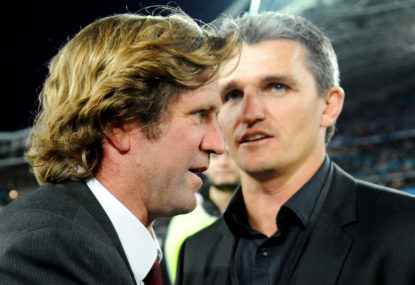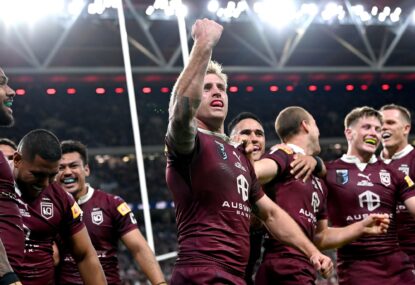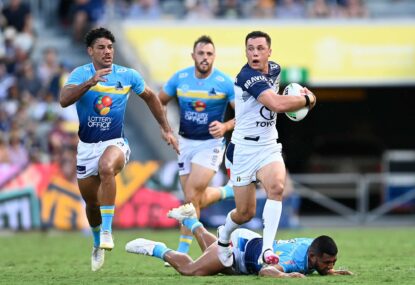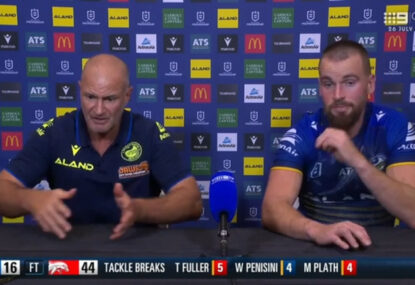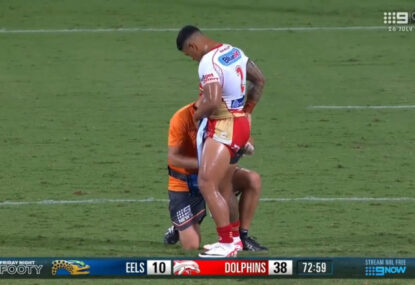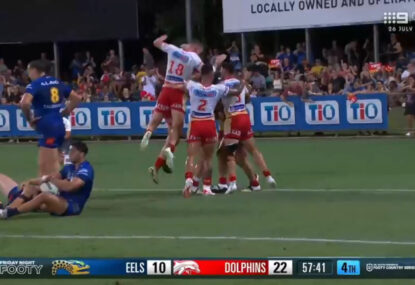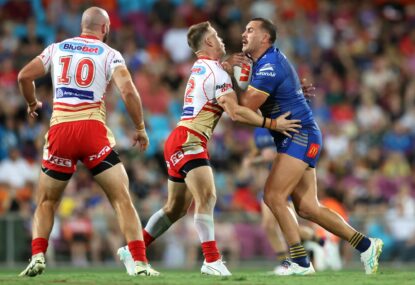Fear not, Tigers fans. There is still light at the end of the tunnel that is the 2017 season, according to Wests Tigers CEO Justin Pascoe.
Despite having let go coach Jason Taylor after just three rounds, and having yet to formally announce a replacement (Ivan Cleary has all but been given the job, if he wants it), Pascoe claimed ahead of Sunday’s clash with the Melbourne Storm that the team was still aiming to play the finals.
Of course, this in itself is not such an outrageous claim. In fact, any club chairman worth his salt would say the same thing. After all, why play in the competition if you weren’t aiming to be there in September?
Without a permanent head coach for the future and rumours of player upheaval the Tigers are in shambles. And not too many teams standing on such unstable ground can call themselves contenders, even for a Top 8 spot.
Of course, this isn’t the first time a coach his left his post before season’s end, although Taylor’s three week 2017 campaign may be the shortest.
Using a historical perspective, do Tiger fans still have reason to hope despite losing their coach? Let’s take a look at a few times when a club lost their coach during a season, and how they fared.
2004: South Sydney Rabbitohs
Last year, the Tigers came within one win of a Top 8 spot. In 2003, the Rabbitohs had won just three games. Yet while Jason Taylor lasted just three matches, despite his side having won a game, the South Sydney Rabbitohs sacked Paul Langmack after having given him half the season to prove himself, finally deciding his fate following a dismal record of two wins and a draw.
Of course, the circumstances were different, and the playing rosters on two opposite ends of the spectrum in terms of talent, which Langmack’s assistant Arthur Kitinas found out quickly after he took the reins as caretaker coach.
In his 13 games as coach, Kitinas’ side managed a record of three games, nine losses and a draw, taking out the wooden spoon for a second consecutive season, before he was replaced at the end of the year.
After two more disastrous seasons in 2005 and 2006, the Rabbitohs finally cracked the Top 8 in 2007 for the first time since being readmitted to the competition five years earlier. Their coach? Jason Taylor.
Before: 15th
After: 15th
2006: Parramatta Eels
Jason Taylor is no stranger to feeling the effects of a mid-season change up in the coaching ranks. In 2006, he was on the other side of the coin as he replaced Brian Smith following a poor start to the season, with the Eels winning just two games in the opening ten rounds.
Sitting in 14th position at the time, not even the most diehard of Parramatta supporters saw their team figuring the finals picture, yet Taylor managed to pull off the seemingly impossible after the Eels managed to finish in eighth position following a miraculous run which included nine successive victories and the debut of Jarryd Hayne, who won Rookie of the Year.
Parramatta’s season came to an end as they were narrowly defeated by Melbourne in the first week of the playoffs, while Taylor left the position at the end of 2006 to take up a position as head coach of the South Sydney Rabbitohs.
Before: 14th
After: eighth
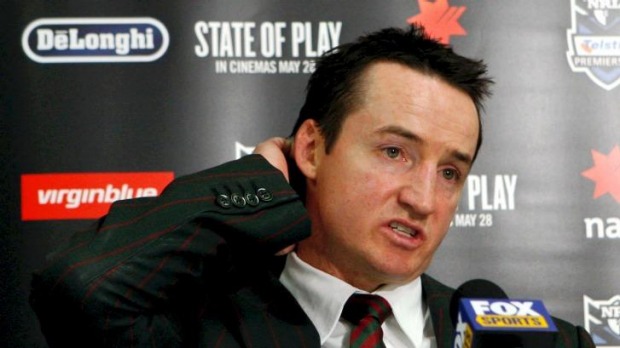
2007: Sydney Roosters
Following a 56-0 drubbing at the hands of Manly in Round 17, Roosters head coach Chris Anderson was let go by the club, and replaced by former captain Brad Fittler. The Roosters’ on-field response was a positive one, as they lost just two of their remaining eight games, with as many wins under Fittler as they had in Anderson’s 17 rounds at the helm that season.
Fittler continued his successful tenure the following season, with his team finishing the regular season in eighth position.
Before: 15th
After: 10th
2009: Newcastle Knights
Once again it was Brian Smith departing a club before season’s end, despite the Knights being one spot outside of the Top 8 at the time of his departure. After the announcement of his signing with the Roosters as head coach for the next four seasons, Newcastle lost their next three games before assistant coach Rick Stone replaced Smith.
Newcastle responded in kind, winning three of their last four games to earn a finals berth for the first time since 2006.
While it was Smith who led the Knights such a competitive position at the latter stage of the season, it was Stone who got them over the line, and the positive effect he had on the team was clear.
Before: ninth
After: seventh
The reason I used these examples, despite having many to choose from due to the insecurity of coaching in the NRL, is that each one of them can serve as a lesson to the Tigers and their fans. While the Eels, Roosters and Knights managed to end their seasons more successfully than they started them, the most telling sign as it pertains to their success was how they performed over the ensuing seasons.
While the Roosters managed a resurgence with Fittler as head coach for the remainder of the 2007 season and finished in the top four the following season, their initial enthusiasm seemed to dissipate quickly as they finished as wooden spooners. As previously mentioned, the Rabbitohs would finish in the bottom three of the ladder not only in 2004 but also 2005 and ’06, before new owners and a shift in club culture provided the resources necessary to compete with other team’s.
Much like the Wests Tigers of 2017, the Parramatta Eels playing roster a decade ago was filled to the brim with promising young players, most of who didn’t not capitalise on their potential. Although they qualified for the finals in 2007, in the long term they were plagued by inconsistency and in-fighting off the field.
These same problems have manifested themselves at the Tigers, and in the long run will have a negative impact of the development of Aaron Woods, Luke Brooks, Mitchell Moses and James Tedesco as players, which is a worrying sign if the club intends to continue building their future around these players.
Ryan Girdler recently said that his former Penrith coach John Lang once told him ‘clubs win premierships, teams do not”. Among the many lessons to be learned from the aforementioned teams is that a change of coach is not enough to turn a team’s fortunes around.
If Ivan Cleary is to take the position of as expected, it will take more than a top eight finish in 2017 to cement the Tigers as a promising team going ahead.
With 53 personnel changes in various departments of the club taking place in the last five years alone, the club is on uneasy ground, which will eventually fall apart beneath them regardless of whether they make the finals or not.
And at some point the Tigers have to realise that if they are to rediscover, or even approach, their glory days of 2005 they must dig in and do the hard work required of them, rather than rely on quick-fix measures and costly decisions which ultimately end up being about as effective as a band-aid on a severed jugular.





























































































